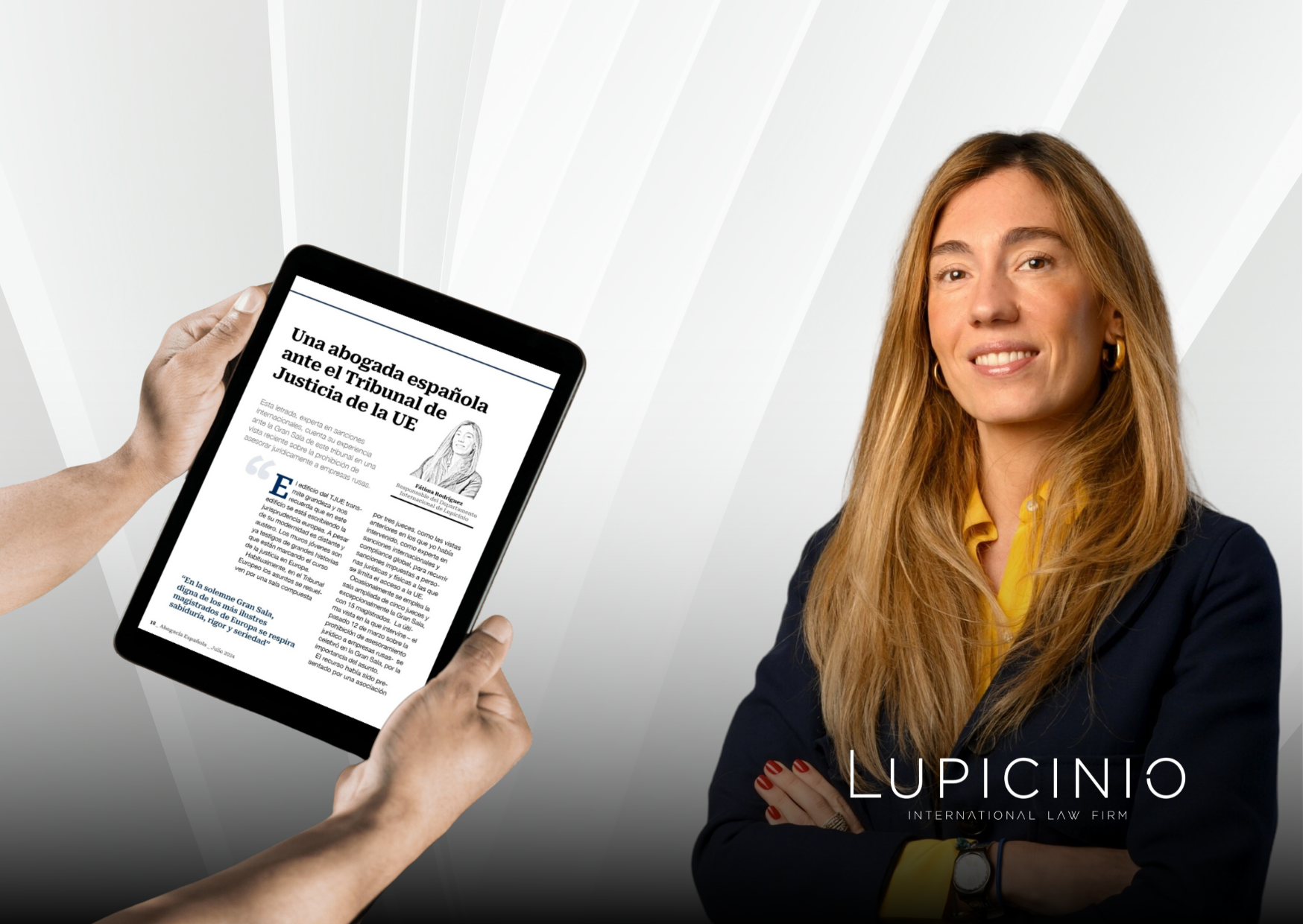A long administrative process, initiated on 8th May 2022 from this Firm, against an unfortunate decision of Sofía Puente, General Director of Legal Certainty and Public Trust (Directora General Seguridad Jurídica y Fe Pública), and María del Mar López Álvarez, her Deputy Director of Nationality, Seguridad Jurídica y Fe Pública, which communicated to our client, Linda Gómez-Trevijano (her married name Redding), born on 9th January 1971, thought the General Consulate of Spain in London, the loss of her Spanish nationality of origin, for not having declared her will to keep it during the three years following the acquisition of her British nationality on 7th August 2003.
I therefore proceeded, as her legal representative, to apply for the residence exemption for the recovery of the Spanish nationality, provided for in Article 26 of the Civil Code, when there are “exceptional circumstances”, as in this case. On 4th July 2022, the corresponding ‘optional appeal for reconsideration’ was filled.
It included the exceptional circumstances required: firstly, an identical precedent resolved four years earlier by the same unit, formerly DGRN (General Direction of Register and Notary), in favour of the grandchildren of an Spanish Consul in Paris, Raimundo Bassols, whose daughter was born outside of Spain due to her family’s diplomatic posting. In the case of our client, Linda, her progenitor has been born in Rabat as the child of the spouse of the then General Consul there, Agustín Gómez-Trevijano.
To this circumstance other six circumstances were added, also extraordinary, although some more than others: the applicant’s residence in London; marriage and subsequent divorce of a British citizen; sole custody of the two daughters in favour of the mother: visiting rights for the father; schooling there of the two children – one of them with special needs in an ad hoc educational institution -; conflictive relations with the progenitor who was the subject of an ill-treatment, resolved by mediation; self-employment of the appellant; and her responsibilities towards her elderly ‘dependent mother’, also resident in London.
The Firm had opted to reach a solution through administrative channels, and was determined to avoid litigation, at a time when the Parliament was beginning to debate the draft Law presented by the Government, “Procedural Efficiency Measures of the Public Justice Service”, which advocates for ‘alternative methods of dispute resolution’ (ADR) as a formula capable of helping to overcome the current collapse of our Courts.
Without intending to expand on the events that have taken placed since then in relation to this case (see link), the following actions should be mention: firstly, a letter to the heads of the aforementioned General Directorate on 13th July requesting “a favourable solution within the legal period of 30 days to prevent the time limit for a rejection of the administrative silence from starting to run, which would force us to initiate a contentious-administrative action”.
En segundo lugar, y antes de cumplirse los dos meses de silencio, la presentación el 29 de agosto de una queja ante el Defensor del Pueblo, figura constitucional llamada a “supervisar la actividad de la Administración”. La queja fue aceptada por el Defensor, en escrito de Ángel Gabilondo de 8 de septiembre, “por entender que reúne los requisitos establecidos en el art. 54 de la Constitución”, iniciando inmediatamente su labor de mediación. Sorprendentemente, la DGSJyFP (“Directore General of Legal Certainty and Public Trust”) contestaría, tres meses después, el 4 de enero 2023, que “no había constancia de la interposición de un recurso de reposición frente a la resolución denegatoria de la dispensa del requisito de residencia para la recuperación de la nacionalidad española a nombre de Linda Gómez-Trevijano”.
Secondly, and before the two months of silence had elapsed, on 29th August, a complaint was lodged with the Ombudsman, a constitutional figured called upon to “supervise the activity of the Administration”. The complaint was accepted by the Ombudsman, in a letter from Ángel Gabilondo on 8th September, “on the understanding that it meets the requirements established in Article 54 of the Constitution”, and he immediately began his mediation work. Surprisingly, the DGSJyFP (“Directorate General of Legal Certainty and Public Trust”). Surprisingly, the DGSJyFP replied, three months later, on 4th January 2023, that “there was no record of the lodging of an appeal for reconsideration against the decision of denying the waiver of the residence requirement for the recovery of Spanish nationality on behalf of Linda Gómez-Trevijano”.
The Ombudsman’s Office itself corrected the inexplicable error, sending the aforementioned General Directorate a copy of our appeal with all the entry stamps in its registration unit. The Ombudsman added, in his letter of 17th January 2023, that “it has been considered appropriate to make the following suggestion: that the aforementioned appeal be resolved as appropriate without delay”.
Only twenty-four hours after, – although after more than six months of administrative silence – the Spanish Consulate in London summoned our client to notify her, on 1st February, “the Resolution issued by the DGSJyFP in which it was agreed to reject the appeal and confirm the resolution adopted”.
Although the Resolution ended with the usual paragraph: “Against this decision, which puts an end to administrative proceedings, a contentious-administrative appeal may be lodged with the National High Court within two months”, this Office remained determined to explore as far as possible the legal options available through administrative channels. In a last effort to avoid this other contentious route, which is longer, more expensive, and burdensome for our Courts, on 10th February, it was decided to file an Extraordinary Appeal for Review, as the conditions required in the Article 125.1 of LAW 39/2015 on “Common Administrative Procedure of Public Administrations”: were met; letter a), error of fact, and letter b), new document, the entry into force of the Law of Democratic Memory. I did not fail to recall, at the end of the well-founded brief, in an amendment, that “according to the Article 109 of the aforementioned Law, the Spanish Administration can always revoke ex officio its unfavourable acts.
Certainly, what happened let us to feel obliged to publicly denounce the poor functioning of the aforementioned Directorate General, and, more specifically, the Subdirectory General for Nationality that is dependant of it, in a well-considered media campaign. First, (see link), three tweets highlighting the difference in treatment given to the grandchildren of a diplomatic who completed a successful career until his retirement in the years of the Transition, compared to that given to the granddaughter of another colleague who, for having declared himself loyal to the Republic, was reprisalised by Franco’s regime, losing his career and being force into exile in Argentina, where he remained until his death in 1961.
In addition, two articles published in digital media. The first one, (see link), in the political legal blog of Melitón Cardona, on 3/2/2023, “A specific case, with names, on the deterioration of our Administration of Justice”, where he said: “I recognise the reluctance to resort to administrative channels and I acknowledge my responsibility, but I justify myself, in addition to my respect to the Judges, who are called upon to resolve more complex issues, reminding me that my client urgently needs a favourable decision before his first-born daughter reaches the age of majority, which would prevent her from acquiring Spanish nationality together when her patriotic mother recovers it”.
And the second, “Unequal treatment in equal situations”, in Otrosí.net belonging to the ICAM (the Madrid Bar Association), on 14-2-2023, where I ended by stating that “the rejection decision in question merely reiterates, in a certainly stereotyped manner, that the appellant does not accredit exceptional circumstances, also avoiding mentioning the precent of the previous ‘advance decision’, as I called it in some laudatory reflections that I published in issues 84 of the magazine “El Notario de siglo XXI (The 21st century Notary)”.
One cannot but wonder, as in a good thriller, will the reiterated Directorate General of Legal Security and Public Trust give in and recognise the ‘proven extraordinary circumstances’, or will it force the long-suffering State Lawyers to defend before Court a case that the Administration will lose having to pay the attorneys of the winning side, and compensation for the moral damages caused to the mistreated administered?
It will continue…
******
More información:
Lupicinio International Law Firm
C/ Villanueva 29
28001 Madrid
P: +34 91 436 00 90
info@lupicinio.com







